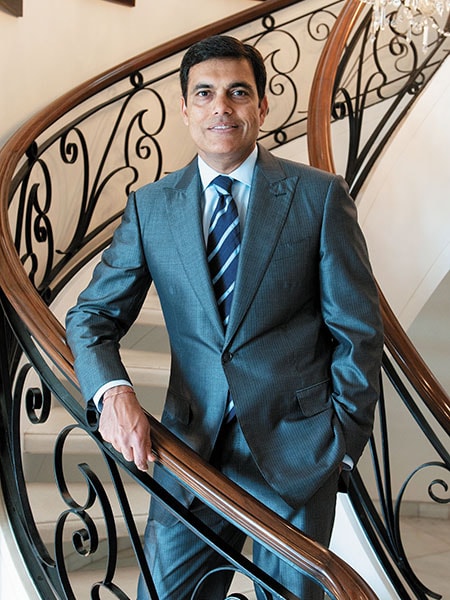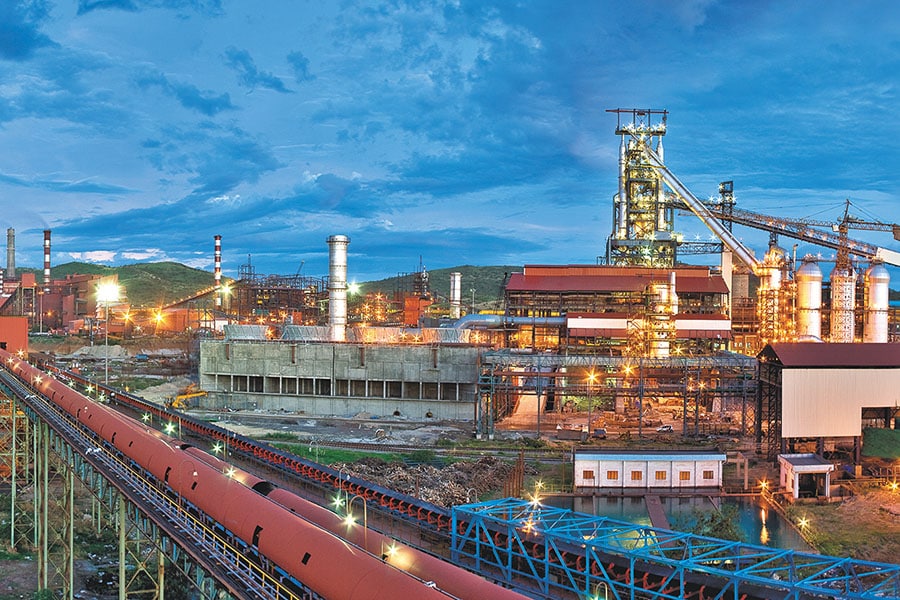Sajjan Jindal sees $100 billion opportunity for the Indian industry
Chairman of JSW Group, on avoiding dependence on Chinese imports, the likelihood of the economy picking up from October and opportunities during the coronavirus crisis


 Sajjan Jindal
Sajjan Jindal
Image: Vikas Khot[br]Q. What does the JSW Group import from China and what is the quantum of those imports?
Our imports from China are classified into two broad segments: Direct and indirect. The former is valued at about $400 million annually and comprises raw materials or consumables required in our manufacturing process. The second can be attributed to our purchase of equipment and machinery. While we purchase equipment from German, Italian, South Korean or Japanese manufacturers, they have workshops or an assembling facility in China. We are looking to avoid these indirect procurements from China and urging these manufacturers to set up operations in India or elsewhere.
Q. How long would it take to start a vendor base in India and has the company taken any concrete steps in this regard?
We have identified potential suppliers for these critical raw materials within India as well as in other countries. We will work closely and support them in achieving the right quality at the right price. As these companies scale up in time, the price differential over China would become negligible. This transition will not happen overnight and we have set ourselves a target of 24 months for it to happen. There is a possibility of a slight discomfort in the next few months as we groom new vendors for our raw material requirements. This will have a small impact on the overall cost of production in the short term, but I see it regularising over a period of time. In the long term, I see us being much better placed than we currently are, as most of our vendors will be producing a high quality product within India it will also shorten our lead time, given the location of production. I believe that as we set an example by building a supply network in India, other industries will see the benefit in doing the same. For example, Indian auto manufacturers import a number of their parts, but Indian ancillary units in that sector are exporting to a number of manufacturers globally, which means the product and vendor base are available locally, but not being utilised. These supply chain modifications would have to be made consciously to make India a more self-reliant nation and we hope to lead the way. As more industries commit to use a locally sourced and developed supply chain, I see a $100 billion opportunity for the Indian industry.
Q. What is your opinion on the stimulus package announced by the government?
The ₹20 trillion stimulus package for making India self-reliant (Atma Nirbhar) is a step in the right direction. The increased focus on strengthening the micro, small and medium enterprises (MSMEs)—considered to be the backbone of the economy—is also a welcome move. At JSW Steel, we have made a commitment to support the MSME sector by making our wide range of high-quality steel products available to domestic engineering goods manufacturers at international prices. This initiative, in partnership with the Engineering Export Promotion Council, will enhance the global competitiveness of locally manufactured products and make India a new exporter of engineering goods.
Q. Most of your businesses—steel, power, mining, cement etc—are allied with core manufacturing. What impact has the coronavirus pandemic had on your businesses?
The JSW Group was not immune to the impact of the coronavirus pandemic. Our first response to the crisis was to institute a number of measures and protocols to ensure the safety of our colleagues and their families. Like most other manufacturing units, we had to bring down our capacity utilisation during the lockdown across most businesses. Now, as the country starts to unlock, we are starting to bring back production levels to optimum capacity. Power is the only business which ran operations at a near-normal run rate. The JSW Steel Vijayanagar plant, located in the Ballari-Hospete iron ore belt, is the world’s sixth largest steel plant with a capacity of 12 million tonnes per annum[br]Q. How long will it take to recover from this? The Reserve Bank of India has predicted negative growth… how will it affect manufacturing companies?
The JSW Steel Vijayanagar plant, located in the Ballari-Hospete iron ore belt, is the world’s sixth largest steel plant with a capacity of 12 million tonnes per annum[br]Q. How long will it take to recover from this? The Reserve Bank of India has predicted negative growth… how will it affect manufacturing companies?
We are still in the middle of challenging times. A predicted negative growth rate of 4 to 5 percent will make the revival of our economy quite a task, with domestic demand remaining subdued. With a favourable monsoon and buoyant rural demand, expected infrastructure spending push and better foreign direct investment inflows, I expect the economy to start picking up early October onwards.
Q. Which businesses do you expect to come out of the woods first? And has the pandemic forced you to rewire the company’s plans?
We are present in the core sectors of the economy and as economic activities gain momentum through these phase-wise unlocks, I see all our group businesses moving towards normalcy. There is often an opportunity in a crisis… we at the JSW Group have used this time to implement a number of initiatives to rebase our cost structure and align our business model through an accelerated adoption of technological tools and digitalisation initiatives.
Q. JSW Steel has taken board approval for raising ₹14,000 crore. By when do you plan to start the capital raising process and is the market conducive for that?
These are enabling approvals as part of a regular process. There are no immediate plans to raise equity in JSW Steel. However, we continuously evaluate various scenarios and remain in a state of preparedness. Our focus is to conserve liquidity, prioritise all discretionary spending and complete key strategic projects.
Q. Would you be looking to reduce the debt at some of your companies or would it remain at the same levels?
At the JSW Group, we remain committed to maintaining fiscal discipline and prudence in capital allocation… our target is to maintain leverage ratios at healthy levels. At JSW Steel, our net debt—which stood at about ₹53,000 crore at the end of March 2020—may appear to be high. If not for the lockdown-related disruptions in March, which led to a drop in sales and a subsequent inventory build-up, leverage at year-end could possibly have been lower. However, of this amount, about ₹18,000 crore is leverage on account of new projects which are currently under implementation and at various stages of completion. In other words, our core leverage for the current 18 MTPA (million tonne per annum) capacity is only about ₹35,000 crore, which is one of the lowest in the industry. As some of these projects get progressively commissioned during FY21 and start generating returns, it will set in motion a natural deleveraging process in FY22.
Q. Would you be looking at restructuring any businesses?
If at all any restructuring has to be done, it will be suitably communicated in accordance with all applicable regulatory requirements.
Q. As a group, will you be curbing your capex plans? If yes, for which businesses and by when will you restart them?
We have undertaken a detailed exercise to prioritise all planned and discretionary spends with the twin objective of conserving liquidity and completion of strategic projects which are in advanced stages of completion. We have announced a calibrated spending plan of ₹9,000 crore in JSW Steel for FY21.
Q. Given the situation in Chile, when do you expect mining to stabilise?
The mines in Chile are under care and maintenance, and we have provided for the value of investments there.
Q. Have you restarted construction at any of your sites? Also, by when do you expect the migrant workforce to come back?
At Dolvi Works, we received permission to restart activities in end April. We were able to ramp up our existing operations in an efficient and timely manner. However, progress on the 5 MTPA expansion project has been delayed as we face the fallouts of the pandemic. Further, non-availability of foreign experts (from our technology and equipment suppliers) due to international travel restrictions has impacted our commissioning schedule. With regard to the migrant workforce shortage, I see it as a temporary issue that we have had to deal with. I see the situation normalising in the next two to three months. A lot of the workforce that went home is now returning to the cities/towns they left and reporting back to their jobs. A number of organisations have also made efforts to ensure their smooth return.
Q. How are you preparing to restart the engine when things start opening up?
We have adapted to the new normal at all our locations across the country. We have benchmarked our standard operating procedures with global industries while restarting and are using effective technological solutions for screening and testing our people to ensure safety across our business locations. Also, with a gradual demand recovery, for capital-intensive industries, it will be imperative to remain in the lowest quartile of the cost curve, to operate plants at high capacity utilisation, and develop new customers and markets for our products. I think the resilience of a developing economy such as India is enough to give us hope.
Q. What lessons has this pandemic taught you, personally and professionally?
Society has always had historical milestones that define it—Pre and Post AD, Pre and Post BC, and even a Pre and Post Spanish Flu period, for example. Similarly, we have to acknowledge that there was a pre-pandemic world and there will be a post-pandemic world too. The individuals and organisations that will gain post pandemic are those that adapted to the changing circumstances effectively and found opportunities in the crisis. A post-pandemic world will also be highly digitalised, where digitalisation will complement most forms of human activity.
First Published: Aug 04, 2020, 11:34
Subscribe Now